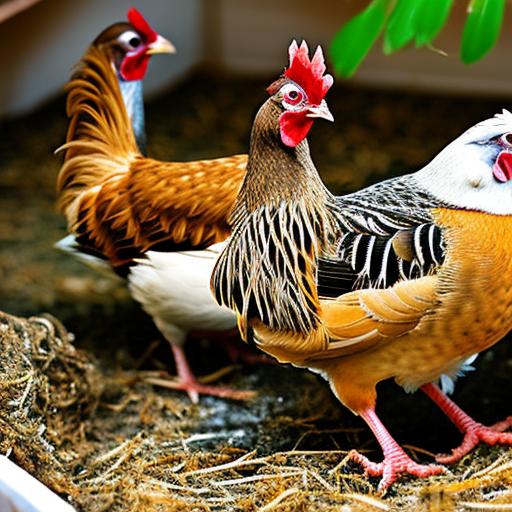Keeping chickens indoors is a rising trend that has gained popularity in recent years. More and more people are choosing to bring these feathered friends into their homes, reaping the benefits of fresh eggs, companionship, and even potential health benefits. However, this trend also comes with its own set of challenges, such as mess and odor issues, as well as the need for proper ventilation and cleaning. In this article, we will explore the benefits and challenges of keeping chickens indoors, as well as provide tips and considerations for those interested in embarking on this unique journey.
Key Takeaways
- Keeping chickens indoors is becoming a popular trend.
- Indoor chickens can provide fresh eggs and companionship.
- Challenges of indoor chicken keeping include noise and odor issues.
- Choosing the right breed and creating a safe living space is important.
- Indoor chickens require proper feeding, care, and health considerations.
The Benefits of Keeping Chickens in the House
One of the main benefits of keeping chickens indoors is the convenience of having fresh eggs readily available. Instead of having to make a trip to the grocery store, you can simply walk into your kitchen and collect eggs from your own flock. This not only saves time and money but also ensures that you have access to high-quality, organic eggs that are free from antibiotics or hormones.
Another benefit of keeping chickens indoors is the joy of having them as pets and the bonding experience it can create. Chickens are intelligent creatures with unique personalities, and many people find great joy in interacting with them on a daily basis. They can become part of the family, providing companionship and entertainment.
In addition to the companionship aspect, there are potential health benefits to having chickens indoors. Studies have shown that interacting with animals can reduce stress levels and improve overall well-being. Furthermore, taking care of chickens requires physical activity, such as cleaning their living space or providing them with exercise opportunities. This can be a great source of exercise for both adults and children alike.
The Challenges of Keeping Chickens in the House
While there are many benefits to keeping chickens indoors, there are also some challenges that come along with it. One of the main challenges is the potential mess and odor issues. Chickens produce waste, and if not properly managed, it can lead to an unpleasant living environment. Regular cleaning and proper ventilation are essential to maintain a healthy and odor-free space.
Proper ventilation is crucial when keeping chickens indoors. Chickens produce ammonia in their waste, which can be harmful if not properly ventilated. It is important to have windows or vents that allow for fresh air circulation and to regularly clean the living space to prevent the buildup of ammonia.
Another challenge that can arise from keeping chickens indoors is the potential noise issues. Chickens are known to be vocal creatures, and their crowing or clucking can be disruptive, especially in a confined indoor space. It is important to consider the noise level and whether it will be suitable for your living situation before bringing chickens indoors.
Choosing the Right Breed of Chicken for Indoor Living
When considering keeping chickens indoors, it is important to choose a breed that is well-suited for this type of living arrangement. Some breeds are known for being calm and docile, making them more suitable for indoor living. Silkies and Cochins are examples of breeds that are known for their calm temperament and adaptability to indoor environments.
In addition to temperament, it is also important to consider the size of the breed and the space available for them to live in. Smaller breeds, such as bantams or miniature chickens, may be more suitable for indoor living due to their size and lower space requirements. It is important to provide enough space for them to move around comfortably and engage in natural behaviors.
Creating a Safe and Comfortable Living Space for Indoor Chickens
Creating a safe and comfortable living space is essential when keeping chickens indoors. Proper bedding, nesting boxes, and perches should be provided to ensure their comfort and well-being. Bedding materials such as straw or wood shavings can be used to provide a soft and absorbent surface for the chickens to rest on.
Nesting boxes should be provided for the chickens to lay their eggs in. These boxes should be filled with clean bedding material and placed in a quiet and secluded area to provide privacy for the hens. Perches should also be provided to allow the chickens to roost and rest comfortably.
In addition to providing a comfortable living space, it is important to provide adequate space for exercise and socialization. Chickens are social animals and thrive when they have opportunities to interact with each other. Providing enough space for them to move around freely and engage in natural behaviors, such as scratching or dust bathing, is essential for their well-being.
Feeding and Caring for Indoor Chickens

Feeding indoor chickens a balanced diet is crucial for their health and well-being. A diet consisting of high-quality chicken feed supplemented with fresh fruits, vegetables, and occasional treats can provide them with the necessary nutrients they need. It is important to provide fresh water at all times and access to grit, which helps with digestion.
Regular veterinary care is also important when keeping chickens indoors. Chickens can be susceptible to various health issues, such as respiratory infections or parasites. Regular check-ups and vaccinations can help prevent these issues and ensure that your chickens are healthy.
Dealing with Noise and Odor Issues
To minimize noise and odor issues associated with indoor chickens, proper ventilation and cleaning are essential. As mentioned earlier, proper ventilation helps prevent the buildup of ammonia from chicken waste. Regular cleaning of the living space, including removing waste and replacing bedding, can help keep odors at bay.
Using odor-neutralizing products or air purifiers can also help minimize odors associated with indoor chickens. These products can help absorb or eliminate odors in the living space, creating a more pleasant environment for both the chickens and their owners.
Training Chickens for Indoor Living
Training chickens to behave appropriately indoors is important to ensure a harmonious living environment. Positive reinforcement and consistency are key when training chickens. Rewarding desired behaviors, such as using the designated nesting boxes or perches, can help reinforce these behaviors.
Clicker training or other positive reinforcement techniques can be used to train chickens. By associating a clicker sound with a reward, chickens can learn to associate certain behaviors with positive outcomes. Consistency in training and providing regular opportunities for socialization can help chickens adapt to their indoor living environment.
Health Considerations for Indoor Chickens and Their Owners
There are some health considerations to keep in mind when keeping chickens indoors. Chickens can carry bacteria such as salmonella, which can be transmitted to humans through contact with their feces or feathers. It is important to practice proper hygiene and sanitation, such as washing hands thoroughly after handling chickens or their waste.
Regular cleaning of the living space and providing proper ventilation can help minimize the risk of respiratory issues associated with indoor chickens. It is also important to monitor the chickens for any signs of illness or distress and seek veterinary care if necessary.
On the flip side, having chickens as emotional support animals can provide potential benefits for their owners. Interacting with animals has been shown to reduce stress levels and improve overall well-being. The companionship and bond that can be formed with indoor chickens can provide comfort and support for their owners.
Is Keeping Chickens in the House Right for You?
In conclusion, keeping chickens indoors is a rising trend that offers many benefits, such as convenient access to fresh eggs, companionship, and potential health benefits. However, it also comes with its own set of challenges, such as mess and odor issues, as well as the need for proper ventilation and cleaning. Before deciding to keep indoor chickens, it is important to carefully consider your lifestyle and living situation.
If you have the time, space, and commitment to provide a safe and comfortable living environment for indoor chickens, this unique experience can be rewarding and fulfilling. It is important to do thorough research, consult with experts, and seek support from the chicken-keeping community to ensure the well-being of both the chickens and their owners.
If you’re considering keeping chickens in your house, you may want to explore alternative options that provide a suitable living space for your feathered friends. One such option is the Producers Pride Sentinel Chicken Coop, which offers a secure and spacious environment for your chickens to thrive. Another option worth considering is the Chicken Coop Muskegon, designed specifically to meet the needs of urban chicken keepers. Alternatively, if you have an unused shed on your property, you can transform it into a functional and comfortable chicken coop. To learn more about turning a shed into a chicken coop, check out this informative article on PoultryWizard.com.
FAQs
Can you keep chickens in the house?
Yes, you can keep chickens in the house, but it is not recommended.
What are the reasons for not keeping chickens in the house?
Chickens produce a lot of dust, dander, and feathers, which can cause respiratory problems for humans. They also have a strong odor and can be noisy.
What are the alternatives to keeping chickens in the house?
The best alternative is to keep chickens in a coop or a run outside. This will provide them with fresh air, sunlight, and space to move around.
What are the requirements for keeping chickens outside?
Chickens need a secure coop or run to protect them from predators, access to fresh water and food, and a clean and dry environment.
What are the benefits of keeping chickens?
Keeping chickens can provide fresh eggs, fertilizer for gardens, and can be a fun and educational experience for children and adults alike.
What are the different breeds of chickens?
There are many different breeds of chickens, including Rhode Island Reds, Leghorns, Plymouth Rocks, and Silkies, among others.
What do chickens eat?
Chickens eat a variety of foods, including grains, vegetables, fruits, and insects. They also require access to clean water at all times.
Meet Walter, the feathered-friend fanatic of Florida! Nestled in the sunshine state, Walter struts through life with his feathered companions, clucking his way to happiness. With a coop that’s fancier than a five-star hotel, he’s the Don Juan of the chicken world. When he’s not teaching his hens to do the cha-cha, you’ll find him in a heated debate with his prized rooster, Sir Clucks-a-Lot. Walter’s poultry passion is no yolk; he’s the sunny-side-up guy you never knew you needed in your flock of friends!







